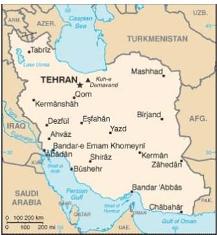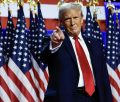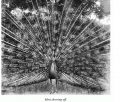US sanctions of Iran hurts India, leaves China unaffected


{This article first appeared on Policy Research Group web site, poreg.org}
Washington does not seem to be `too serious’ to enforce these sanctions. This is clear from the `loopholes’ in the relevant laws, which appear as a deliberate act of realpolitik factoring in the limitations of American long arm in reining in countries like China that have vibrant trading links with Iran.
Early August (on the 3rd and the 5th) the US Government made two separate announcements in a bid to further tighten the ‘sanctions regime’ against Iran, describing Tehran as the “most active State sponsor” of terrorism. The first was the long awaited “Country Reports on Terrorism for 2009” by the National Counter Terrorism Centre (NCTC). The second was by the US Treasury Department clamping sanctions against `Islamic Revolutionary Guard Corps – Qods Force’, and 21 entities of the Iranian foreign trade network operating in Belarus, Germany, Italy, Japan and Luxembourg.
While the executive summary of the `Report on Terrorism for 2009’ mentioned Iran as the `most active state sponsor’ of terrorism, it did not list any attacks that may have been actually sponsored by Iran. However, Daniel Benjamin, Coordinator for Counter Terrorism and Russ Ravers, Deputy Director of the NCTC have tried to justify the designation.
Addressing a press meet on Aug 5, the two experts claimed that several people had been killed in Iraq as a result of Iranian munitions, supply of which could be traced back to Iran. They also spoke of Iranian support to the Hamas and the Hizballah.
Both Daniel and Ravers went on to say that though there was evidence of state support from Iran and Syria, such `facilitation’ didn’t form part of their report. They agreed that for a long time the pre-dominant instigators of violence in the world are not state sponsored groups but non-state groups like Al Qaida and its affiliates.
The US Treasury has declared that Iran is using its state apparatus, including IRGC – Qods Force, and state-run social service organisations to support terrorism under the guise of providing reconstruction and economic development assistance or social services.
Sanctions on Tehran show Washington comes down by an inch from its high pedestal when the green backs future remains uncertain and when a few yuans are about to fall into its lap. It also shows the bruised global cop has no qualms to jump back to the pulpit when countries like India enter into commercial dealings with Iran for access to Afghanistan and Central Asia. And State Department’s roofs begin to leak. For the American media, the leaks become manna.
The organisations and their leaders under the Treasury scanner are:
• Four senior officers of the Islamic Revolutionary Guard Corps-Qods Force, (IRGC-QF), Hushang Allahdad, Hossein Musavi, Hasan Mortezavi and Mohammad Reza Zahedi for their alleged role in the IRGC-QF’s support of terrorism.
• The Iranian Committee for the Reconstruction of Lebanon, (ICRL), and its director, Hessam Khoshnevis, for allegedly providing financial, material, and technological support to Hizballah
• Imam Khomeini Relief Committee, (IKRC), Lebanon branch – owned or controlled by Hizballah, and for providing financial and material support to Hizballah and its director, Ali Zuraik; and
• Razi Musavi, a Syria-based Iranian official, for allegedly providing financial and material support to Hizballah. (See the Annexure –I for full details)
Under the `Iranian Transactions Regulations’, the US Treasury’s notification has listed 21 entities as owned or controlled by the Government of Iran and prohibited any dealings by the Americans with them. According to the Under Secretary for Terrorism and Financial Intelligence, Stuart Levey, as its isolation from the international funding and commercial system increases, the Iranian government is creating dubious entities to evade the sanctions. The entities that have been brought under sanctions operate in areas like banking, insurance and investment, mining and engineering industries. (See detailed list at Annexure II).
Washington does not seem to be `too serious’ to enforce these sanctions. This is clear from the `loopholes’ in the relevant laws, which appear as glaring, and, therefore, deliberate.
The sanctions law has a clause, which entitled ‘exemptions’. Careful reading of the clause shows that the exemption regime is an act of realpolitik and it adroitly factors in the limitations of American long arm in reining in a number of countries like China and Russia that have vibrant trading links with Iran. The US will need the support of these very countries at the UN to push its case for sanctions against Tehran. As a result, many Chinese, Russian and Turkish companies continue to operate in Iran and also supply oil despite sanctions. Put mildly, the American sanctions talk the talk but don’t walk the talk.
Consider the facts. `Wisconsin Project on Nuclear Arms Control’ has concluded that Chinese state-owned companies blacklisted by America for selling arms to Iran have had no problem in doing business with the US companies. “Lacklustre enforcement of US sanctions is allowing Chinese companies to ship goods to the United States even after being threatened with an import ban on proliferation to Iran”, said the report released in December 2009.
New Delhi has to use Iranian territory for reaching out to some of its markets. What other option India have when Pakistan refuses ‘transit’ facility? Through Kashmir India could have reached out to Afghanistan and Central Asia but that part of Kashmir which could have given this advantage to Delhi is under occupation by Pakistan and China.
One of these Chinese companies is CPMIEC, China Precision Machinery Import-Export Corporation. It was described as a “serial proliferator” of missile technology to Iran. LIMMT Economic and Trade Company Ltd is another Chinese firm that has been found on the wrong side of American law.
CPMIEC has been the target of proliferation sanctions since 1991. It remained undeterred and came under more sanctions in 2002 and again in 2003 for its continued arms sales to Iran. LIMMT Economic and Trade Company Ltd is much more audacious in its evading the US trade restrictions. It has adopted a new name to do business with its American clients. The Manhattan Grand Jury indicted the company in April last year on charge that it was covertly using New York Banks to finance large quantities of restricted material to Iran’s ballistic missile and nuclear programmes.
The triangle that emerges from the foregoing defies conventional logic. It only shows that the US administration can afford to be lax and come down by an inch or two from its high moral pedestal when the green backs future remains uncertain and when a few yuans are about to fall into its lap.
It also shows that the bruised global cop has no qualms to jump back to the pulpit when countries like India enter into commercial dealings with Iran prompted as much by their legitimate geo-political strategic interests, as business opportunities. And the State Department roofs begin to leak. For the American media, the leaks become manna.
Texas-based online intelligence service, Stratfor, says India is looking for ways of getting around the American and UN sanctions against Iran. Quoting a report, titled “International Sanctions on Iran and way forward for India-Iran relations”, the Stratfor mentioned of various options that India is said to be exploring. One option is making a request to Washington to exempt India from the sanctions regime and thus facilitate Indian companies’ trade with Iran, without “getting caught in the sanctions dragnet”.
Stratfor is not new to such ‘despatches’, some as in the instant case, are attributed to so-called Indian documents. The message that comes through is clear; the intent that comes out loudly is equally clear. And it pressurise India, malign India, and deny India a level playing field, when, like any other country in its neighbourhood, it is looking to protect its business and strategic interests.
Such a pressure is quite surprising. For two reasons. One the Chinese companies are enjoying a `free ride’ to and in the Islamic Republic. Two the US has strategic partnership with India. So, comes upfront is the question: Is America insensitive to New Delhi’s `core’ national interests?
New Delhi has use to Iranian territory for reaching out to some of its markets. What other option India have when Pakistan refuses ‘transit’ facility for Indian trade bound for Afghanistan and Central Asia. Through Kashmir India could have reached out to Afghanistan and Central Asia but that part of Kashmir which could have given this advantage to Delhi is under occupation by Pakistan and China.
Refusing to factor in this reality is in neither strategic nor diplomatic interest. The US exit plan from Afghanistan starting from next year is its concern born out of as much worry over body bags as the fear of Vietnam repeat.
But India cannot afford to be myopic. It has look at as much at the near term as the short term of the consequences of an American pull out with no Plan B in place so to say. India and others similarly placed cannot afford to countenance a situation that throws the red carpet once again to the Jihadis and their allies across the Durand Line.
The short point is India has a national interest. It is within its rights to work towards protecting its rights. Delhi is not subscribing to the theory of no concern whatsoever when national interests are involved propagated and adhered to by some countries. It is only saying that there cannot be any bar to explore opportunities to engage Iran, within international legal bounds, while adhering to the larger objective of persuading the Islamic Republic to desist from any illegal nuclear arms activity.
Instead of targeting India, and denying it a level playing field, it should be co-opted into the US effort for walking the talk with Iran because there cannot be any bar to explore opportunities to engage Iran, within international legal bounds for the largest country with longest borders in South Asia
Instead of isolating or targeting India, this largest country with longest borders in South Asia should be co-opted into the US effort through a `group of interested countries’- China, Russia, and EU including, for walking the talk with Iran and in Afghanistan.
ANNEXURE I
Islamic Revolutionary Guard Corps-Qods Force (IRGC-QF) Leadership
Treasury today further targeted the IRGC-QF by designating four of its senior officers: Hushang Allahdad, Hossein Musavi, Hasan Mortezavi and Mohammad Reza Zahedi.
* Hushang Allahdad has been a financial officer for the IRGC-QF since at least 2002. In this position, Allahdad personally oversees distribution of funds to Levant-based terrorist groups and provides financial support for designated terrorist entities including Hizballah, Hamas, and PIJ.
*RGC-QF General Hossein Musavi is Commander of the IRGC-QF Ansar Corps, whose responsibilities include IRGC-QF activities in Afghanistan. As Ansar Corps Commander, Musavi has provided financial and material support to the Taliban.
*In his capacity as an IRGC-QF senior officer, Colonel Hasan Mortezavi provides financial and material support to the Taliban.
*Mohammad Reza Zahedi, the commander of the IRGC-QF in Lebanon, plays a key role in Iran’s support to Hizballah. Zahedi held several senior positions in the IRGC-Qods Force including Commander of the Lebanon Corps and Deputy Commander of the Qods Force. He has also acted as a liaison to Hizballah and Syrian intelligence services and is reportedly charged with guaranteeing weapons shipments to Hizballah.
IRGC and IRGC-QF Support for Terrorist Organizations:
* The IRGC-QF is the Government of Iran’s primary arm for executing its policy of supporting terrorist and insurgent groups. The IRGC-QF provides material, logistical assistance, training and financial support to militants and terrorist operatives throughout the Middle East and South Asia. It was designated by Treasury pursuant to E.O. 13224 in October 2007 for its support of terrorism.
*The Government of Iran also uses the Islamic Revolutionary Guard Corps (IRGC) and IRGC-QF to implement its foreign policy goals, including, but not limited to, seemingly legitimate activities that provide cover for intelligence operations and support to terrorist and insurgent groups. These activities include economic investment, reconstruction, and other types of aid to Iraq, Afghanistan, and Lebanon, implemented by companies and institutions that act for or on behalf of, or are owned or controlled by the IRGC and the Iranian government.
*In Afghanistan, the IRGC-QF provides select members of the Taliban with weapons, funding, logistics and training. In Iraq, the Government of Iran trains, equips, and funds Iraqi Shia militant groups.
*In the Levant, the IRGC-QF continues to support designated terrorist groups such as Hizballah and Hamas. Hizballah is the largest recipient of Iranian financial aid, training, and weaponry; and Iran’s senior leadership has cited Hizballah as a model for other militant groups. Iran also provides training, weapons, and money to Hamas, bolstering the group’s ability to maintain its armed resistance and opposition to Israeli-Palestinian peace negotiations.
Iranian Committee for the Reconstruction of Lebanon (ICRL)
* The ICRL provides financial, material, and technical support to Hizballah. It was established by the Government of Iran after the 2006 Israel-Hizballah conflict and functions as a key channel for Iran’s support to Hizballah reconstruction efforts in Lebanon.
In addition to ICRL’s stated mission of supporting reconstruction, ICRL has financed and facilitated Hizballah’s infrastructure and private communications network that enables the terrorist group to communicate securely.
The ICRL has provided funding and engineering expertise to Hizballah’s construction arm, Jihad al-Binaa, which was designated by Treasury pursuant to E.O. 13224 in February 2007.
Treasury also today designated ICRL director, Hessam Khoshnevis for providing technical support to Hizballah’s reconstruction efforts in Lebanon and to the expansion of the terrorist group’s private communications network. Khoshnevis also operates as President Ahmadinejad’s personal representative in Lebanon.
Imam Khomeini Relief Committee (IKRC) Lebanon Branch
The IKRC in Lebanon is a Hizballah social service organization that was created by the Government of Iran in the 1980s and is directed and run by Hizballah members or cadre. Iran has provided millions of dollars to the Hizballah-run branch in Lebanon since 2007.
The IKRC has helped fund and operate Hizballah youth training camps, which have been used to recruit future Hizballah members and operatives. Hizballah Secretary General Hassan Nasrallah has acknowledged the IKRC branch in Lebanon as one of Hizballah’s openly-functioning institutions linked to and funded by Iran.
Also designated today is the director of IKRC in Lebanon, Ali Zuraik, for acting for or on behalf of the IKRC in Lebanon. Zuraik has also publicly acknowledged that the IKRC in Lebanon operates under the umbrella of Hizballah.
Razi Musavi
Razi Musavi is a Syria-based Iranian official who is a key conduit for Iranian support to Hizballah. He provides crucial support to Hizballah, including financial and material support to the Lebanon-based terrorist group that is closely allied with Iran and often acts at its behest.
Identifying Information:
Individual: Hushang Allahdad AKA: Hushang Allahdadi AKA: Sa’id Golzari
Passport No.: 08550695 Passport No.: A0022791
Individual: Hossein Musavi
Nationality: Iranian
Passport No: A0016662 (issued October 29, 2002)
DOB: October 23, 1960
POB: Neishabour, Iran
Individual: Hasan Mortezavi AKA: Ali Hassan Mortezavi AKA: Hassan Ali AKA: Majid Mirali Mortezavi AKA: Majid Mortezavi
Passport No: 7572775
Citizenship: Iranian
DOB: April 28, 1961
POB: Ghazvin, Iran
Individual: Mohammad Reza Zahedi AKA: Ali Reza Zahedi AKA: Reza Mahdavi AKA: Mohammad Riza Zahdi AKA: Hasan Mahdawi
Nationality: Iranian
DOB: 1944
POB: Esfahan, Iran
Location: Beirut, Lebanon
ANNEXURE II
Entity: The Iranian Committee for the Reconstruction of Lebanon AKA:
Iranian Headquarters for the Reconstruction of Lebanon AKA:
Iran’s Headquarters for the Reconstruction of Lebanon, AKA:
Iranian Committee for Contribution in the Reconstruction of Lebanon AKA:
Iranian Organization for Reconstruction in Lebanon AKA:
Iranian Committee for Rebuilding Lebanon AKA:
Iranian Organization for Rebuilding Lebanon AKA:
Iranian Contributory Organization for Reconstructing Lebanon AKA
Iranian Commission for Rebuilding Southern Lebanon AKA:
Iranian Commission in Lebanon AKA:
Iranian Committee to Reconstruct Lebanon Location:
Near Iranian Embassy, Brazilia Building, 1st Floor, Lebanon
Individual: Hessam Khoshnevis AKA:
Hesam Khosh-nevis AKA:
Hesaam Khosh-Nevis AKA:
Hesam Khoshnevis AKA:
Hassan Khoshnvis AKA:
Hussam Khosh AKA:
Hussam Khoshnevis AKA:
Hussam Khouchnoyess
Nationality: Iranian
Passport: A0023862
Entity: Imam Khomeini Relief Committee (Lebanon Branch) AKA:
Imam Khomeini Relief Organization AKA:
Islamic Charity Emdad AKA:
Islamic Emdad Charitable Committee AKA
Comite Islamique Daides et de Biem Liban AKA:
Imam Khomeiny Aid Committee AKA
Imdad Islamic Association Committee for Charity AKA:
Islamic Charity Emdad Committee AKA:
Emdad Assistance Foundation AKA:
Emdad Committee for Islamic Charity AKA:
Imdad Committee for Islamic Charity AKA:
Imdad Association of the Islamic Philanthropic Committee AKA:
al-Imdad AKA:
Imam Khomeini Support Committee AKA:
Imam Khomeini Emdad Committee AKA:
Imam Khomeini Imdad Committee AKA:
Komite Emdad Emam AKA:
Imam Khomeini Foundation AKA:
Khomeini Social Help Committee AKA:
Khomeini Charitable Foundation
Location: P.O. Box 25-211 Beirut AiRabi’ Building 2nd Floor Mokdad Street Haret Hreik, Beirut, Lebanon, P.O. Box: 25/221 El Ghobeiry, Beirut, Lebanon
Individual: Ali Hasan Zuraik AKA:
Ali Hassan Zreik AKA:
Ali Zraiq AKA: Ali Zurayq AKA:
Ali Zreik
Passport No: RL0266714
Passport No: 1082625
DOB: 1952
POB: Al Khiyam, Lebanon
Individual:
Razi Musavi AKA: Hosein Razi Musavi
DOB: 1964
Location: Damascus, Syria
-
Book Shelf
-
 Book Review
DESTINY OF A DYSFUNCTIONAL NUCLEAR STATE
Book Review
DESTINY OF A DYSFUNCTIONAL NUCLEAR STATE
- Book ReviewChina FO Presser Where is the fountainhead of jihad?
- Book ReviewNews Pak Syndrome bedevils Indo-Bangla ties
- Book Review Understanding Vedic Equality….: Book Review
- Book Review Buddhism Made Easy: Book Review
- Book ReviewNews Elegant Summary Of Krishnamurti’s teachings
- Book Review Review: Perspectives: The Timeless Way of Wisdom
- Book ReviewNews Rituals too a world of Rhythm
- Book Review Marx After Marxism
- Book Review John Updike’s Terrorist – a review
-
-
Recent Top Post
-
 NewsTop Story
Pope Francis dies: an unconventional pontiff who sought to modernise Catholicism
NewsTop Story
Pope Francis dies: an unconventional pontiff who sought to modernise Catholicism
-
 CommentariesTop Story
India’s Migration Dilemma
CommentariesTop Story
India’s Migration Dilemma
-
 Commentaries
Crowd Management Blues
Commentaries
Crowd Management Blues
-
 Meher Baba SpeaksNews
Meher Baba Loved Them Too…
Meher Baba SpeaksNews
Meher Baba Loved Them Too…
- Commentaries Record Pentagon spending bill and America’s hidden nuclear rearmament
-
 CommentariesNews
Ides of trade between India and Pakistan
CommentariesNews
Ides of trade between India and Pakistan
-
 Commentaries
How sustainable is the rhetoric of India-China Bhai-Bhai
Commentaries
How sustainable is the rhetoric of India-China Bhai-Bhai
-
 CommentariesTop Story
New Set of Diplomatic Strains with Canada
CommentariesTop Story
New Set of Diplomatic Strains with Canada
-
 News
Ratan Tata’s Legacy
News
Ratan Tata’s Legacy
-
 Commentaries
India’s Strategic Push on the World Stage
Commentaries
India’s Strategic Push on the World Stage
-
AdSense code
















